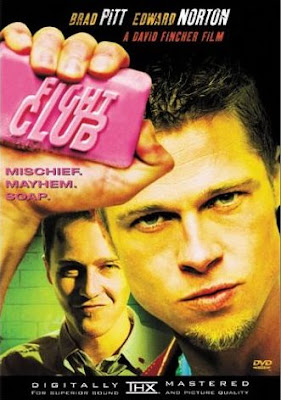Fight Club: A Novel
Chuck Palahniuk
1996
An
Alexandrine Couplet Comparing The Book To The Movie
Certain parts make more sense and the scope
is bigger,
but you all saw the film—it’s pretty
much the same.
 |
| The movie’s so good you’d never guess I was Brad Pitt’s body double in this scene. |
I’m about to make a bold statement:
Chuck Palahniuk is one of the best writers of the 20th century. I’ll
qualify that by saying half his books aren’t all great. I actually finished Choke
(yeah, I’m the one) so I know they’re not all diamonds. But when he’s on, like
in Survivor,
Rant,
and yes, Fight Club, it’s transcendent. It’s the sort of writing that
makes writers jealous.
Enough ass-kissing.
Fight Club,
though it didn’t really get credit for this, largely defines its generation,
and the current one. It’s about how we’re so busy being told what to do and own
and how to define ourselves, and trying to live up to the unrealistic, preset expectations
of our parents and society, that we can’t figure out how to do what we want or make
ourselves happy. It’s about how consumer culture and advertising has perverted
us, and when this was written that wasn’t the common notion it is now. Of course,
because Chuck wrote it, Fight Club decides the only solution to this problem
is the Nihilistic destruction of society, worldwide.
 |
| It would have been much easier for Tyler to hire this guy. Just sayin’. |
The Nihilist theme is one of the few
differences between the book and movie. In Fight Club The Movie, you
don’t see or understand the full scope of Fight Club/Project Mayhem/Tyler
Durden’s Wet Dream. In the movie, Tyler and Friends are anarchists trying to
take down society. They’re blowing up financial buildings. (I can’t be the only
one who notices that terrorists blowing up financial buildings was totally
acceptable in 1997, but that’s a whole different discussion). In Fight Club
The Novel, they’re dropping a financial building on top a natural history museum
– attacking corporate America as well as history and culture. That’s an attack
with a very different purpose. It’s also a worldwide movement in the book.
The other big difference, really, is
that you understand a lot better in Fight Club The Novel how it’s all
really about Marla all along, that Tyler is doing all this, taking a sledge
hammer to society at large, because he’s so emasculated and callow that he doesn’t
have the balls to ask her on a date.
 |
| Nothing says “diner and a movie” like the destruction of society. |
—Alternate Picture—
 |
He could have just asked Snoop Dogg for
advice.
Really, it would have been a much easier
solution.
|
Oh yeah, and one more difference: Meatloaf is in the movie.
 |
|
Because he loves Chuck Palahniuk,
and he’ll do anything for love.
|
Look, it’s an excellent book. It’s as
good a book as the movie is a movie, and they’re both classics. If you haven’t
read it, you should. Or just watch it if you haven’t in a few years. Both
couldn’t hurt.
 |
| Because this image is just too iconic not to include. |




